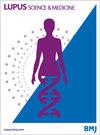系统性红斑狼疮患者低疾病活动状态不同子集的特征和结果
IF 3.7
2区 医学
Q1 RHEUMATOLOGY
引用次数: 0
摘要
目的 狼疮低疾病活动度状态(LLDAS)允许系统性红斑狼疮有一定的临床和/或血清学活动度,前提是总体疾病活动度不超过预定的临界值。本研究旨在评估达到低疾病活动状态(LLDAS)并伴有临床活动、仅伴有血清学活动或既无临床活动也无血清学活动的患者的治疗效果。方法 纳入 2013 年 3 月至 2020 年 12 月期间加入前瞻性跨国队列的系统性红斑狼疮患者,这些患者至少参加过一次 LLDAS。同时符合 LLDAS 和系统性红斑狼疮缓解定义(DORIS)标准的就诊病例将被排除在外。结果 共纳入 2099 名患者,中位随访时间为 3.5 年(IQR 1.3-5.8)。在6150人次的随访中,患者符合LLDAS标准,但不符合DORIS标准;其中1280人次(20.8%)有一定的临床活动,3102人次(50.4%)仅有血清学活动,1768人次(28.8%)既无临床活动也无血清学活动。多变量回归分析表明,与非 LLDAS 相比,LLDAS 的所有三个子集与随后 6 个月的复发和随后 36 个月的损害累积都有保护关系。与有临床活动的LLDAS相比,无临床或血清学活动的LLDAS对随后6个月的严重复发具有明显更强的保护作用(HR 0.47,95% CI (0.27 to 0.82),P=0.007)。结论 无任何临床活动的LLDAS占LLDAS就诊人数的近80%。这项研究证实,LLDAS 的所有子集都与病情发作和损害累积的减少有关。然而,无任何临床或血清学活动的 LLDAS 与严重复发的保护性关联最强。如有合理要求,可提供数据。APLC集合数据的获取须遵守APLC数据获取政策(可向APLC指导委员会索取)中列出的具体指导原则。APLC 欢迎对汇总(摘要)数据或对新研究问题进行分析的请求,此类请求可通过 APLC 项目经理提交 APLC 指导委员会。本文章由计算机程序翻译,如有差异,请以英文原文为准。
Characterisation and outcomes of different subsets of low disease activity states in patients with systemic lupus erythematosus
Objectives The lupus low disease activity state (LLDAS) allows for certain clinical and/or serological activity of SLE, provided overall disease activity does not exceed predefined cut-offs. This study aimed to evaluate the outcomes of patients who achieved LLDAS with clinical activity, serological activity only or neither clinical nor serological activity. Methods Patients with SLE enrolled in a prospective multinational cohort from March 2013 to December 2020 who were in LLDAS at least once were included. Visits that fulfilled both LLDAS and Definition of Remission in SLE (DORIS) criteria were excluded. Results 2099 patients were included, with median follow-up of 3.5 (IQR 1.3–5.8) years. At 6150 visits, patients were in LLDAS but not DORIS criteria; of these 1280 (20.8%) had some clinical activity, 3102 (50.4%) visits had serological activity only and 1768 (28.8%) visits had neither clinical nor serological activity. Multivariable regression analysis showed that compared with non-LLDAS, all three subsets of LLDAS had a protective association with flares in the ensuing 6 months and damage accrual in the ensuing 36 months. LLDAS with no clinical or serological activity had a significantly stronger protective association with severe flares in the ensuing 6 months compared with LLDAS with clinical activity (HR 0.47, 95% CI (0.27 to 0.82), p=0.007). Conclusions LLDAS without any clinical activity accounted for almost 80% of LLDAS visits. This study confirms that all subsets of LLDAS are associated with reduced flare and damage accrual. However, LLDAS without any clinical or serological activity has the strongest protective association with severe flares. Data are available on reasonable request. Access to APLC pooled data is subject to the specific guidelines outlined in the APLC data access policy (available on request to the APLC steering committee). The APLC welcomes requests for aggregate (summary) data or to perform analyses of new research questions, and such requests can be submitted to the APLC steering committee via the APLC project manager.
求助全文
通过发布文献求助,成功后即可免费获取论文全文。
去求助
来源期刊

Lupus Science & Medicine
RHEUMATOLOGY-
CiteScore
5.30
自引率
7.70%
发文量
88
审稿时长
15 weeks
期刊介绍:
Lupus Science & Medicine is a global, peer reviewed, open access online journal that provides a central point for publication of basic, clinical, translational, and epidemiological studies of all aspects of lupus and related diseases. It is the first lupus-specific open access journal in the world and was developed in response to the need for a barrier-free forum for publication of groundbreaking studies in lupus. The journal publishes research on lupus from fields including, but not limited to: rheumatology, dermatology, nephrology, immunology, pediatrics, cardiology, hepatology, pulmonology, obstetrics and gynecology, and psychiatry.
 求助内容:
求助内容: 应助结果提醒方式:
应助结果提醒方式:


